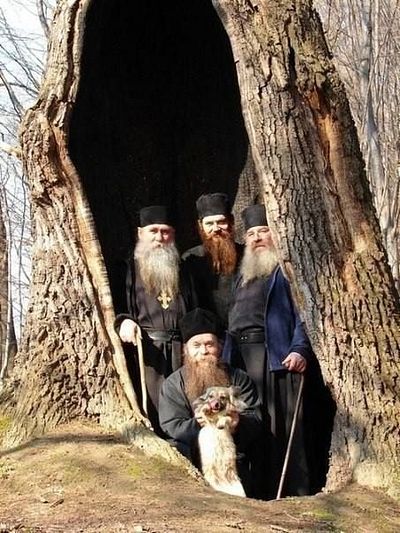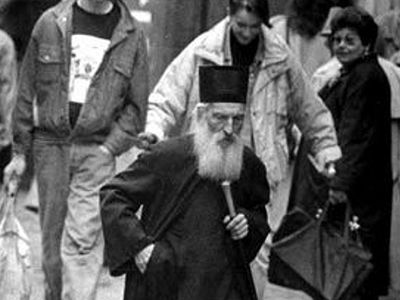In the time of their visitation they will shine forth, and will run like sparks through the stubble. (Wisdom 3:7 RSV)
The story is told of St. Macarius that he was falsely accused of fathering a child by a young woman in the village. After being beaten and humiliated by the people there, he returned to his cell and gathered all of the mats and baskets he had made and gave instructions that they were to be sold, and the money given “to my wife.” In time, he was vindicated of the crime for which he had been falsely accused.
St. Francis’ disciple, Brother Juniper, was falsely accused of theft, murder and a number of such crimes. He immediately confessed that he was guilty of everything. He was rescued at the last minute from hanging through the intercession of the friars.
All of us stand falsely accused.
That might sound surprising, since most of us carry some constant level of moderate guilt. And though we wouldn’t dare go as far as Brother Juniper and submit to hanging, or agree to support a child for whom we have no responsibility, nonetheless, we generally agree to some level of guilt and quietly task ourselves with improving.
“I can’t believe I did that! What must I have been thinking?”
Our lives are a strange mix of virtue and vice. Alexander Solzhenitsyn said that the line between good and evil did not run between nations, nor even between groups or individuals, but within every human heart. Some portion of our heart accuses the other, and with just cause. But we also stand falsely accused.
Our passions cloud our judgment (and guilt can indeed act like a passion). We cannot accurately judge ourselves because we do not see the truth (not even of ourselves). By the same token, we do not and cannot judge others rightly. We are simply incompetent as judges.
Solzhenitsyn is right, however. The dividing line does not run between us, but within us. Sergius Bulgakov once suggested that the parable of the sheep and the goats is incorrectly applied to individual versus individual, and should be applied instead within the heart of each individual. This coincides with St. Gregory of Nyssa’s thoughts on salvation in which the judgment exists to destroy our sins and faults and restore us to our true nature. I will leave that argument to others (for there are so many who rise to great eloquence on the topic).
I have wandered within the heart for a very long time, both my own as well as others. If you suspend judgment, you find a vast reality, both good and bad, dark and light. I have never encountered a heart that is entirely dark, though I have been in some where the light was indeed quite dim and isolated. I always try to remind myself that Christ is the Light and that darkness does not overcome Him. Christ is the Shepherd of the light. An early Christian title for believers was “children of the light.”
Christ knows His sheep and calls us each by name. Most of us don’t know our names yet. Helping someone learn their name (and learning it myself) is the pastoral art. It is the work of Jesus.
Those whom we cannot love are strangers to us. When we are not able to recognize another, it is simply a symptom that we are seeing them through the darkness of our own heart. Christ knows His sheep and sees the truth of our being.
The hiddenness of the human life is often obscured by our modern understanding. In many contemporary Christian treatments, we are viewed as an intellect with a will. We think. We choose. And many are quick to pronounce judgments on others on account of their choices. Indeed, for some, the last choice in life supersedes all earlier choices: “as a tree falls, so it lies.” It is a deeply reductionistic approach to human beings, rendering us flat, with no depth beyond the most cursory surface of our decisions.
The Scriptures suggest something quite different. We are told that our life is “hid with Christ in God” (Col. 3:3). We are told that what we shall be “does not yet appear” (1 John 3:2). We are told that we will receive “a new name written on a stone which no one knows except him who receives it” (Rev. 2:17). This hiddenness is similar to other themes in the New Testament. The gospel itself is a mystery, hidden from the ages, etc. Christianity is “apocalyptic” in character, that is, it is revelatory, making known that which is hidden.
Of course, it’s difficult to live in a world in which the truth of its reality is hidden.
There is a theme, not restricted to Christianity alone, that sees spiritual awareness as “waking up.”
Therefore it is said, “Awake, O sleeper, and arise from the dead, and Christ shall give you light.” (Eph 5:14)
To wake up is both to see what is there, but to discern what might be hidden. A true watchman has to engage in more than a cursory glance.
Life in a world whose truth is hidden is often quiet. It is marked far more by listening than speaking. It presumes its own ignorance and waits in wonder for what it does not know. It is frequently surprised.
Consider the soul of St. Macarius. Confronted with a false accuser, he responds with extreme humility and agrees to bear the unjust consequences. What kind of a soul can do such a thing? It means not only enduring a financial burden (tough on a desert monk), but silently bearing the condemnation of the entire community. (This scenario becomes part of the final trial of the protagonist in the recent Russian novel, Laurus). In truth, had Macarius acted out of noble intentions, he would easily have done damage to his soul (and that of his accuser). Rather, within himself, he recognizes, or becomes the sinner whom he is accused to be. This is true, even within Christ, when rightly understood.
Christ does not simply die on our behalf, or instead of us, He becomes sin in order to destroy sin (2 Cor. 5:22). Christ is without sin, and yet He becomes sin. There is nothing “noble” in such an action; nobility would be a deeply unjust accusation. It is self-emptying love.
St. Macarius emptied himself of all claims to righteousness in embracing the false accusation, and in doing so, destroyed that which was false. He embraces the unrighteousness that is hidden within himself, that God might vindicate him with His own righteousness. That is the nature of the true, hidden life.
That which is most obvious is never the full story, either about ourselves or others. Christ invites us into the fullness of His life, to live in union with the full story, no matter how deeply it might be hidden. At the very depth of the soul is a song of unbounded thanksgiving.





